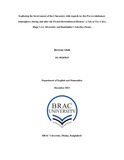Exploring the involvement of the characters with regards to: the pre-revolutionary atmosphere, during and after the French revolution in Dickens’ a Tale of Two Cities, Hugo’s Les Misérables and Baudelaire’s selective poems
Abstract
Historical fictions are a genre of literature through which the writers often take an attempt
to express the social conditions of a past age while blending that historical context with their own imagination. This paper aims to go on a journey, to explore the way the characters in these revolutionary stories of Dickens and Hugo and the speakers of Baudelaire’s poems are exceedingly involved with the pre-revolutionary atmosphere. As we move ahead in the journey, we will explore the way these characters and the speakers react during the French Revolution. Finally we will end our journey by entering the domain of exploring the causes and effects of the revolution that are very impactful on the characters and the speakers. For this purpose the emphasis will be placed on Dickens’ A Tale of Two Cities, Hugo’s Les Misérables and Baudelaire’s following poems: “The Death of the Poor,” “The Murderer’s Wine” and “The Swan”.
This paper is divided into an introduction followed by three chapters, and finally
conclusion. In the first chapter I will talk about the causes which led to the French revolution. In
the second chapter, we will try to see the indisputable occurrence of chaos, destruction and
anarchy during the revolution and in the final chapter, we will explore the both constructive and
disparaging effects of the revolution.
Having studied the fictional portrayal of the French Revolution, I have found that there is
no specific formula behind any revolution as every human being is not the same and therefore
they are not predictable. Consequently, every revolution is different according to its culture,
religion and people. In my findings, things that I find in common are within the causes of the
revolution, such as the uncanny difference between the class interest of different classes, poverty
and social injustice. Presence of chaos, blood-sheds and havoc during the revolution is another common factor in most of the revolution. Moreover, alienation, isolation, devastation and
anarchy are the fundamental effects of the revolution that I find through my research. In
reference to my understanding with the complete study of Dickens, Hugo and Baudelaire, I
would like to draw a conclusion that, a revolution can bring constructive changes to a society if
the people of the society really intend to incorporate the necessary changes, otherwise it can also
create epidemic, chaos and anarchy in that same society.
Keywords
English and humanitiesDescription
This thesis is submitted in partial fulfillment of the requirements for the degree of Bachelor of Arts in English, 2013.Department
Department of English and Humanities, BRAC UniversityType
ThesisCollections
- Thesis, B.A. (English) [645]

